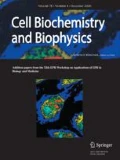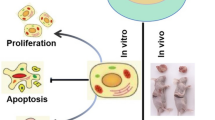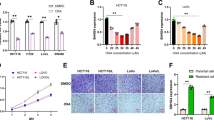Abstract
Cycloxygenase-2 catalyzes the synthesis of prostaglandins from arachidonic acid and this enzyme has been implicated in the metastasis of gastric cancer. In order to examine the significance of cycloxygenase-2 (Cox-2) in the survival and proliferation of gastric cancer cells, we have stably overexpressed an antisense Cox-2 in two gastric cancer cell lines, SGC7901 and AGS, in order to reduce the expression of this protein. The sense and antisense Cox-2 expression vectors were created by cloning COX-2 cDNA, in pIRES2-EGFP plasmid. Cox-2 gene expression was monitored by RT-PCR and Western blotting and the results indicated that cells with antisense Cox-2 construct had significantly reduced Cox-2 expression in comparison to the cells that received sense-Cox-2 plasmid. Reduction of Cox-2 expression in SGC7901 and AGS gastric cancer cells led to markedly decreased proliferation. The metastatic capability of the two cell lines, as assessed by in vitro colony formation assay, is also significantly compromised by lowered Cox-2 expression. Thus, this study demonstrates that Cox-2 activity is necessary for the proliferation and metastasis of gastric cancer cells.





Similar content being viewed by others
References
Wu, K., Nie, Y., Guo, C., Chen, Y., Ding, J., et al. (2009). Molecular basis of therapeutic approaches to gastric cancer. Journal of Gastroenterology and Hepatology, 24, 37–41.
Agarwal, S., Reddy, G. V., & Reddanna, P. (2009). Eicosanoids in inflammation and cancer: The role of COX-2. Expert Review of Clinical Immunology, 5, 145–165.
Sugiyama, T., Yoshimoto, T., Sato, R., Fukai, N., Ozawa, N., et al. (2004). Endothelin-1 induces cyclooxygenase-2 expression and generation of reactive oxygen species in endothelial cells. Journal of Cardiovascular Pharmacology, 44(Suppl 1), S332–S335.
Wang, D., & Dubois, R. N. (2006). Prostaglandins and cancer. Gut, 55, 115–122.
Patrignani, P., Tacconelli, S., Sciulli, M. G., & Capone, M. L. (2005). New insights into COX-2 biology and inhibition. Brain Research Reviews, 48, 352–359.
Samad, T. A., Moore, K. A., Sapirstein, A., Billet, S., Allchorne, A., et al. (2001). Interleukin-1beta-mediated induction of Cox-2 in the CNS contributes to inflammatory pain hypersensitivity. Nature, 410, 471–475.
Stratford, I. J., & Stephens, M. A. (1989). The differential hypoxic cytotoxicity of bioreductive agents determined in vitro by the MTT assay. International Journal of Radiation Oncology, Biology, Physics, 16, 973–976.
Garcia-Rodriguez, L. A., & Huerta-Alvarez, C. (2001). Reduced risk of colorectal cancer among long-term users of aspirin and nonaspirin nonsteroidal antiinflammatory drugs. Epidemiology, 12, 88–93.
Prescott, S. M., & Fitzpatrick, F. A. (2000). Cyclooxygenase-2 and carcinogenesis. Biochimica et Biophysica Acta, 1470, M69–M78.
Wu, W. K., Cho, C. H., Lee, C. W., Fan, D., Wu, K., et al. (2010). Dysregulation of cellular signaling in gastric cancer. Cancer Letters, 295, 144–153.
Jimenez, P., Garcia, A., Santander, S., & Piazuelo, E. (2007). Prevention of cancer in the upper gastrointestinal tract with COX-inhibition. Still an option? Current Pharmaceutical Design, 13, 2261–2273.
Kojima, M., Morisaki, T., Izuhara, K., Uchiyama, A., Matsunari, Y., et al. (2000). Lipopolysaccharide increases cyclo-oxygenase-2 expression in a colon carcinoma cell line through nuclear factor-kappa B activation. Oncogene, 19, 1225–1231.
Chell, S., Kaidi, A., Williams, A. C., & Paraskeva, C. (2006). Mediators of PGE2 synthesis and signalling downstream of COX-2 represent potential targets for the prevention/treatment of colorectal cancer. Biochimica et Biophysica Acta, 1766, 104–119.
Chiba, T., & Marusawa, H. (2009). A novel mechanism for inflammation-associated carcinogenesis; an important role of activation-induced cytidine deaminase (AID) in mutation induction. Journal of Molecular Medicine, 87, 1023–1027.
Oguma, K., Oshima, H., & Oshima, M. (2010). Inflammation, tumor necrosis factor and Wnt promotion in gastric cancer development. Future Oncology, 6, 515–526.
Author information
Authors and Affiliations
Corresponding author
Rights and permissions
About this article
Cite this article
Ma, D., Liu, M., Wang, AP. et al. Cycloxygenase-2 is Essential for the Survival and Proliferation of Gastric Cancer Cells. Cell Biochem Biophys 61, 637–641 (2011). https://doi.org/10.1007/s12013-011-9249-6
Published:
Issue Date:
DOI: https://doi.org/10.1007/s12013-011-9249-6




